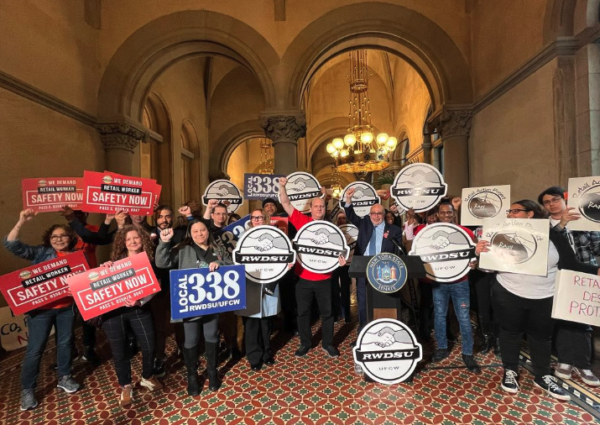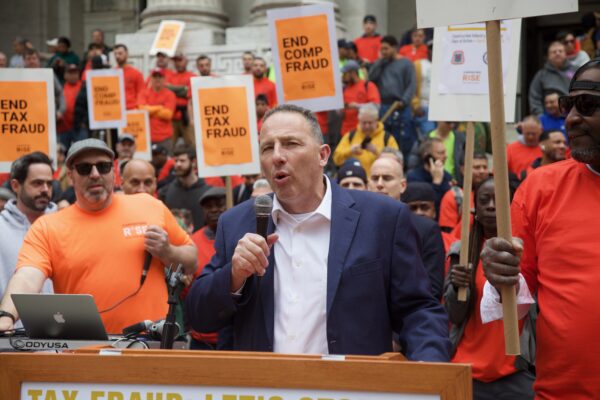WASHINGTON—Judge Brett M. Kavanaugh, Donald Trump’s pick to fill the Supreme Court seat vacated by the retirement of Anthony Kennedy, drew opposition from labor unions within minutes after he was nominated July 9.
vacated by the retirement of Anthony Kennedy, drew opposition from labor unions within minutes after he was nominated July 9.
“Judge Kavanaugh has a dangerous track record of protecting the privileges of the wealthy and powerful at the expense of working people,” AFL-CIO President Richard Trumka said in a statement. “Judge Kavanaugh routinely rules against working families, regularly rejects employees’ right to receive employer-provided health care, too often sides with employers in denying employees relief from discrimination in the workplace, and promotes overturning well-established U.S. Supreme Court precedent.”
Kavanaugh, 53, a judge on the U.S. Court of Appeals for the District of Columbia Circuit since 2006, has a less egregiously anti-labor record than Justice Neil Gorsuch did, but a long history in Washington far-right politics. As a lawyer in the office of Independent Counsel Kenneth W. Starr in the late 1990s, he helped write the report that described President Bill Clinton’s affair with intern Monica Lewinsky in somewhat pornographic detail and advocated his impeachment for denying the affair under oath. In 1999, he represented Florida Gov. Jeb Bush in appealing a court decision that held publicly funded vouchers for religious schools unconstitutional. The next year, he worked on George W. Bush’s lawsuit in which the Supreme Court by a 5-4 vote halted a recount in Florida and selected Bush President.
A member of the right-wing legal organization the Federalist Society, Kavanaugh then worked in the Bush White House helping to select judicial nominees. His own nomination to the D.C. Circuit, unofficially considered the nation’s second-highest court because it rules on cases involving federal regulations, was held up for almost three years by the Democratic opposition in the Senate.
“If there has been a partisan political fight that needed a very bright legal foot soldier in the last decade, Brett Kavanaugh was probably there,” Sen. Chuck Schumer (D-N.Y.) said at a confirmation hearing in 2006. He added that Kavanaugh’s claims that ideological considerations played no role in Bush’s selection of judges were “simply not believable.”
On the appeals court, Kavanaugh “has written almost entirely in favor of big businesses, employers in employment disputes, and against defendants in criminal cases,” legal scholar Dr. Adam Feldman wrote on his EmpiricalScotus blog last December. He ruled in favor of the employer in all 13 employment-dispute cases that came before him.
In 2016, in Verizon New England v. NLRB, Kavanaugh reversed an NLRB decision that let Verizon workers in Massachusetts display pro-union signs such as “Honor Our Contract” in their cars. An arbitrator had ruled that the workers couldn’t do that because their union had waived the right to picket in its contract, but the NLRB said the signs didn’t have the confrontational element of picketing. Kavanaugh wrote that the NLRB could only overrule the arbitration decision if it was “egregiously wrong,” saying that “no hard-and-fast definition of the term ‘picketing’ excludes the visible display of pro-union signs in employees’ cars rather than in employees’ hands, especially when the cars are lined up in the employer’s parking lot and thus visible to passers-by.”
In the 2012 case National Association of Federal Employees v. Vilsack, Kavanaugh dissented from the court’s ruling upholding the union’s challenge to the random drug-testing of all employees working at residential Job Corps Civilian Conservation Centers. The court held that under the Fourth Amendment, the federal government had to have a reason to suspect an individual before it could drug-test them and that there was “no foundation for concluding there is a serious drug problem among staff.”
Kavanaugh argued that because many of the students in the program had previously used drugs, “the government’s strong interest in ensuring a drug-free workforce at these schools outweighs the infringement of individual privacy associated with this drug-testing program.”
He also dissented in two 2017 cases where the court upheld NLRB findings of unfair labor practices or discriminatory hiring. In Midwest Division MMC v. NLRB, he argued that a Kansas hospital did not have to give the National Nurses Organizing Committee union information about a peer-review committee hearing in which two nurses were accused of misconduct. He argued that because the hearing was part of a state licensing process and did not threaten “direct adverse employment action” against the nurses, they had no right to have a union representative present and “the Union’s need for that information is minimal at best.”
In NLRB v. CNN America, the board held that CNN had discriminated against union field technicians when it replaced its unionized contractor with a nonunion, in-house workforce and didn’t hire back most of the union workers. The court said CNN’s reasons for not rehiring them were “pretextual” and the real motive was “anti-union animus.”
Kavanaugh disagreed with the court holding that CNN was a “successor employer” obligated to honor the union contract. He said that if it was OK to terminate the union contract, and CNN wasn’t a joint employer with the contractor, then it was not discrimination for CNN to refuse to rehire union workers.
“We’ve watched as recent decisions have protected the privileged and powerful at the expense of the rest of us,” American Federation of Teachers President Randi Weingarten said in a statement. “Based on the evidence, Judge Kavanaugh is no different. His rulings raise very serious concerns about where he stands on key issues like employees’ right to organize, workplace discrimination, voting rights, marriage equality, access to reproductive healthcare and corporate responsibility.”
She added that Kavanaugh has written that a president should not be subject to subpoena or indictment, and speculated that he “was likely chosen for precisely this reason.”



